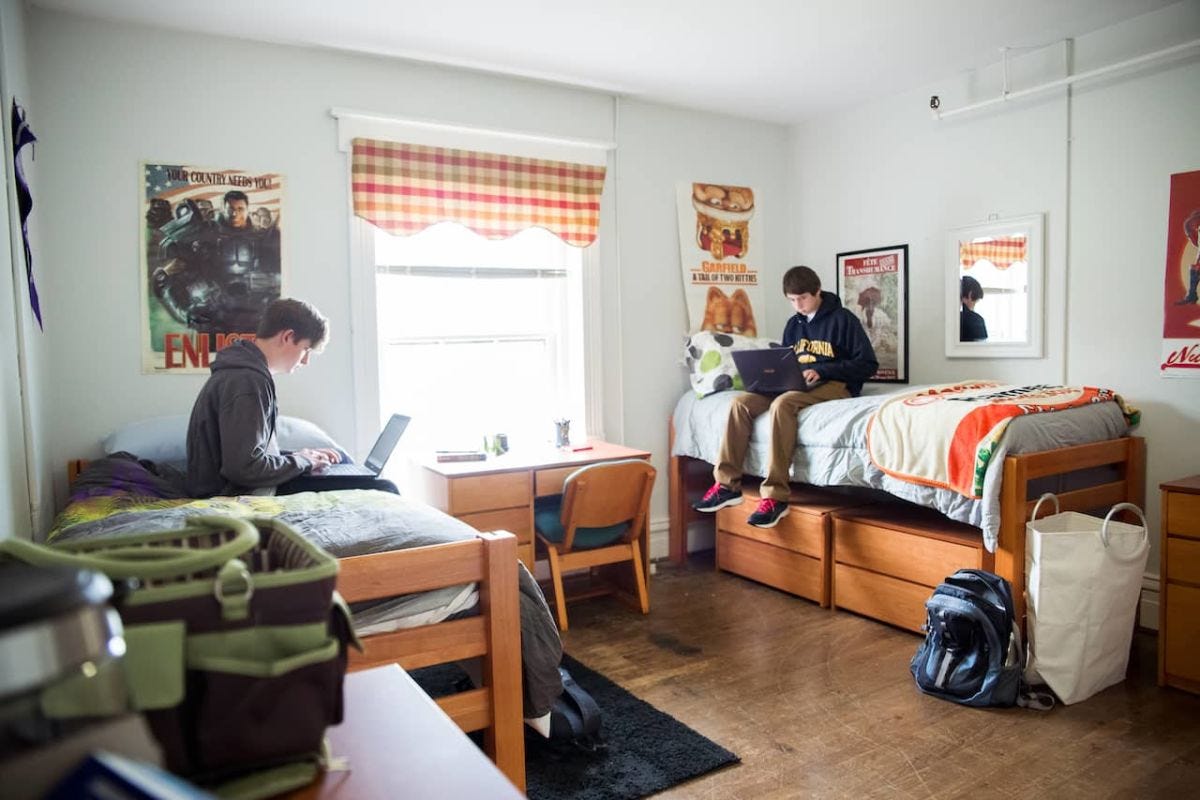Boarding school can be an exciting yet challenging experience. Students are immersed in a structured environment that blends academic rigor with social interaction, creating an atmosphere that fosters both learning and personal development. However, adjusting to this new life demands more than academic prowess; it requires good behavior and the ability to adapt to communal living.
Understanding how to behave in a boarding school is crucial for thriving in this unique environment. Behavior plays a significant role in shaping not only your academic success but also your social experiences and relationships with peers and teachers. By adhering to the rules, respecting others, and maintaining a disciplined lifestyle, students can enjoy the benefits of boarding school while also developing lifelong skills.

Before diving into specific behaviors, it’s essential to grasp what makes the boarding school environment distinct from other educational settings. Boarding schools are not just about academics; they provide a 24/7 learning and living experience that challenges students to balance academic, personal, and social responsibilities within a highly structured framework.
What Makes Boarding Schools Unique?
One of the first things to understand about boarding schools is their structured routine. Unlike day schools, where students leave for home at the end of the school day, boarding school students live on campus. This means they must learn to manage their time effectively throughout the entire day.
A typical boarding school day is packed with various activities, including:
- Morning and evening prep sessions for studying.
- Scheduled extracurricular activities like sports, arts, or clubs.
- Designated meal times where students eat together, further encouraging a sense of community.
- Supervised study periods, which may be held in the dormitories or classrooms.
Living alongside classmates and teachers fosters close-knit relationships, but it also requires students to maintain high levels of responsibility and respect for others. The constant proximity to peers means that personal space and privacy might be more limited than in a typical home setting, which is why respect for shared spaces becomes a vital part of life at a boarding school.
The Rules and Expectations at Boarding Schools
Every boarding school has its own set of rules and expectations, often outlined in a student handbook. These rules help maintain order and create an environment conducive to learning and personal growth. Adhering to these rules is critical to demonstrating good behavior, and violations can lead to serious consequences, such as detention or even expulsion.
Some common rules and expectations include:
- Curfew times: Most boarding schools impose strict curfew rules, requiring students to be in their dorm rooms by a specific time.
- Dress code: Uniforms or specific dress codes are often enforced to maintain a sense of equality and professionalism.
- Respect for authority: Students are expected to show respect toward teachers, dorm supervisors, and all staff members.
- Classroom behavior: Active participation in class is encouraged, and disruptions are discouraged.
- Dormitory etiquette: Since students share living spaces, respecting others’ belongings and maintaining cleanliness are non-negotiable.
In addition to these formal rules, there are unspoken expectations regarding behavior. Students are expected to demonstrate empathy, collaboration, and maturity when interacting with both peers and adults. Following these guidelines is not just about avoiding punishment; it also builds a strong foundation for success, both academically and socially.

Key Behavioral Guidelines for Boarding School Students
Once you’ve grasped the structure and rules of a boarding school environment, the next step is mastering the behaviors that will help you succeed both socially and academically. The following behavioral guidelines are essential for adapting to life in a boarding school and creating a positive experience for yourself and others.
Adapting to a Structured Routine
One of the most significant adjustments for new boarding school students is adhering to a structured routine. Time management becomes essential because, unlike home life, there’s little flexibility in the school’s schedule. Boarding schools are designed to maximize productivity while promoting balance in academic, social, and personal responsibilities. Here are a few tips for adapting to this routine:
- Use a planner or digital calendar to track assignments, exams, and extracurricular activities.
- Set personal goals for the day, such as completing homework before free time or revising class notes.
- Prioritize tasks based on importance and deadlines. Tackling challenging work first can reduce stress later in the day.
- Avoid procrastination by sticking to your study schedule, even when distractions arise.
For example, a student who starts their day by focusing on schoolwork during designated study hours will have more time for relaxation or hobbies in the evening. Managing your time well also means adhering to curfews, attending mandatory activities, and participating in study sessions.
Respect for Authority
Respecting authority figures at boarding school is not just about following the rules; it’s about fostering positive relationships with teachers, dorm supervisors, and administrative staff. These individuals play a key role in your academic journey and personal development.
- Listen attentively when teachers or staff are speaking, whether in class, during assemblies, or in the dorms.
- Be punctual for all school activities. Being late to class or meals can reflect poorly on your sense of responsibility.
- Communicate respectfully, especially when disagreeing with a decision or facing disciplinary action. Learning to express your concerns or disagreements maturely is part of developing into a responsible adult.
- Seek guidance when needed: Authority figures at boarding school are there to support you. Whether you’re struggling academically or personally, don’t hesitate to ask for help.
Case Study: A student at a well-known boarding school who struggled initially with the routine found that building a strong relationship with their dorm supervisor helped them adjust better. By respecting the advice and guidance of the staff, the student was able to improve both academically and socially, learning valuable life skills.
Interacting with Peers
One of the unique aspects of boarding school is the close-knit community of peers. Living and studying alongside classmates means that social skills and respectful interaction are crucial. Strong friendships can be a highlight of the boarding school experience, but it’s important to be aware of how you treat others.
- Be mindful of personal space: Since dorm rooms are often shared, respecting your roommate’s privacy and belongings is vital.
- Resolve conflicts calmly: Disagreements are inevitable, but learning to manage them without escalating into major disputes is a valuable skill.
- Inclusion is key: Boarding schools are often diverse, with students from various backgrounds. Make an effort to include everyone in group activities or social events.
- Avoid gossiping or spreading rumors, as this can damage relationships and create a negative atmosphere in your community.
Peer interactions not only shape your social life but also impact your emotional well-being. Students who actively practice kindness and empathy build a stronger, more supportive community around them.
List: Positive Peer Interaction Tips
- Initiate conversations with new students to help them feel welcome.
- Participate in group activities such as sports or study groups to build friendships.
- Offer help when a classmate is struggling with schoolwork or a personal issue.
- Stay away from cliques that exclude others or foster negative behaviors.

Personal Responsibility and Independence
One of the key aspects of boarding school life is the opportunity to develop a sense of personal responsibility and independence. Living away from home means that students must take ownership of their daily tasks, both academically and personally. This level of responsibility helps students build habits that will serve them well into adulthood.
Taking Responsibility for Personal Belongings
In a boarding school environment, personal space is often limited, especially in shared dormitories. This makes it crucial for students to keep their belongings organized and to respect shared spaces. Here are some practical tips for managing your possessions and maintaining an orderly living space:
- Keep your area tidy: Make it a habit to clean up after yourself daily. This could include making your bed, organizing your desk, and ensuring your clothes are stored properly.
- Label your belongings: With so many students living in close quarters, it’s easy for items to get mixed up. Labeling personal items like clothing, books, and electronics can help avoid confusion.
- Respect shared spaces: Whether it’s the bathroom, common room, or study areas, be considerate of others by keeping these spaces clean and uncluttered. Always clean up after yourself and avoid leaving personal items in communal areas.
- Manage laundry responsibly: Many boarding schools have designated laundry days or facilities. Keeping up with your laundry schedule is an important part of self-care and personal responsibility.
Managing Personal Hygiene and Health
Without parents around to remind them, students must take responsibility for their own health and hygiene. Boarding school students are expected to maintain good hygiene habits, as poor hygiene can affect both personal well-being and relationships with peers.
- Daily hygiene routine: Ensure you brush your teeth, shower, and maintain a clean appearance daily. Poor hygiene can lead to illness and social discomfort.
- Healthy eating habits: Boarding school dining halls offer meals, but it’s still important to make healthy choices. Choose balanced meals and stay hydrated to support both your physical and mental well-being.
- Exercise and physical activity: Many boarding schools offer sports or physical activities. Participating in these not only helps stay fit but also contributes to overall health.
- Sleep hygiene: Ensure you get enough sleep to stay focused and energized during the day. Most boarding schools have set lights-out times, so use that as a cue to maintain a healthy sleep schedule.
Health should also extend beyond physical well-being. Mental health is equally important in boarding school, where the pressure to succeed academically and socially can be high. Recognizing when you need help and seeking support from counselors, friends, or mentors is crucial. Ignoring mental health can lead to burnout, stress, and academic struggles.
Being Accountable for Academics
Academics are at the heart of the boarding school experience, and students are expected to take responsibility for their learning. Unlike traditional schools, where parents often step in to remind students of their homework or upcoming exams, boarding school students are expected to manage these tasks independently.
- Complete assignments on time: Procrastination can quickly snowball into missed deadlines and incomplete work. Establish a routine for completing assignments ahead of time to avoid last-minute stress.
- Organize study sessions: Boarding schools often have designated study periods, but it’s important to create your own routine outside of these times. Self-motivation is key.
- Ask for help: If you’re struggling with a particular subject, don’t be afraid to ask your teachers or peers for help. Boarding school teachers are often more accessible, as they live on campus and can offer additional support outside of regular class hours.
- Effective study habits: Develop habits like reviewing notes after each class, breaking down larger assignments into smaller tasks, and using study techniques like mind maps or flashcards.
Case Study: At a leading boarding school, students who managed their time and took responsibility for their academics were found to perform 30% better on standardized tests than their peers who procrastinated. This demonstrates the importance of personal accountability in academic success.
Taking personal responsibility for your belongings, hygiene, health, and academics not only helps you thrive in boarding school but also prepares you for greater independence in the future.